
United Nations Food and Agriculture Organization (FAO) Director-General Qu Dongyu (C) and other attendees taste Anxi Tieguanyin Tea from China's Fujian Province at the FAO headquarters in Rome, Italy, May 22, 2023.
The FAO awarded certificates at its headquarters here to 24 new Globally Important Agricultural Heritage Systems (GIAHS) sites on Monday.
The 24 sites, which have been designated by FAO since the last ceremony in 2018, are located in 12 countries, including China, Spain, Ecuador, Iran, Italy, Japan, South Korea, and Morocco. (Xinhua/Jin Mamengni)
ROME, May 22 (Xinhua) -- The United Nations Food and Agriculture Organization (FAO) awarded certificates at its headquarters here to 24 new Globally Important Agricultural Heritage Systems (GIAHS) sites on Monday.
The 24 sites, which have been designated by FAO since the last ceremony in 2018, are located in 12 countries, including China, Spain, Ecuador, Iran, Italy, Japan, South Korea, and Morocco.
At the award ceremony on Monday, which also marked the International Day for Biological Diversity, FAO Director-General Qu Dongyu said that many of the GIAHS had become "reservoirs of biological diversity."
"In the context of agri-food systems and rural areas, we need to consider a combined conservation of biodiversity and food diversity. This is the most pragmatic way to raise public awareness of biodiversity.
"Agricultural heritage systems showcase practices that offer solutions to climate change and biodiversity loss, in particular at the local level," he said.
Four of the newly designated GIAHS sites are located in China. These are the Shexian Dryland Stone Terraced System, the Anxi Tieguanyin Tea Culture System, the Ar Horqin Grassland Nomadic System in Inner Mongolia, and the Qingyuan Forest-Mushroom Co-culture System in Zhejiang Province.
Guang Defu, ambassador and permanent representative of China to FAO, said that China is ready to further increase investment in the development of GIAHS and contribute to safeguarding global food security to realize the 2030 Sustainable Development Goals.
GIAHS, a flagship program of FAO, was established in 2002 to identify and protect important agricultural heritage sites and their associated biodiversity, landscapes, knowledge systems, and cultures. This network currently consists of 74 systems across the world, according to the FAO. ■
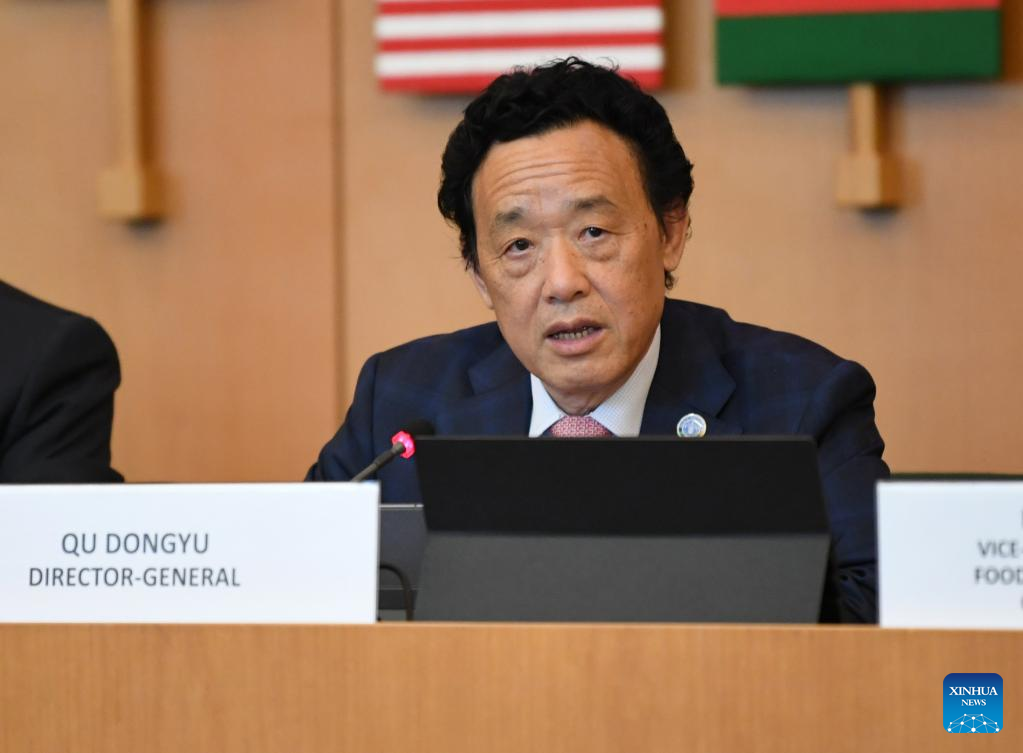
United Nations Food and Agriculture Organization (FAO) Director-General Qu Dongyu addresses the certificate award ceremony for 24 new Globally Important Agricultural Heritage Systems (GIAHS) sites at the FAO headquarters in Rome, Italy, May 22, 2023.
The FAO awarded certificates at its headquarters here to 24 new GIAHS sites on Monday.
The 24 sites, which have been designated by FAO since the last ceremony in 2018, are located in 12 countries, including China, Spain, Ecuador, Iran, Italy, Japan, South Korea, and Morocco. (Xinhua/Jin Mamengni)
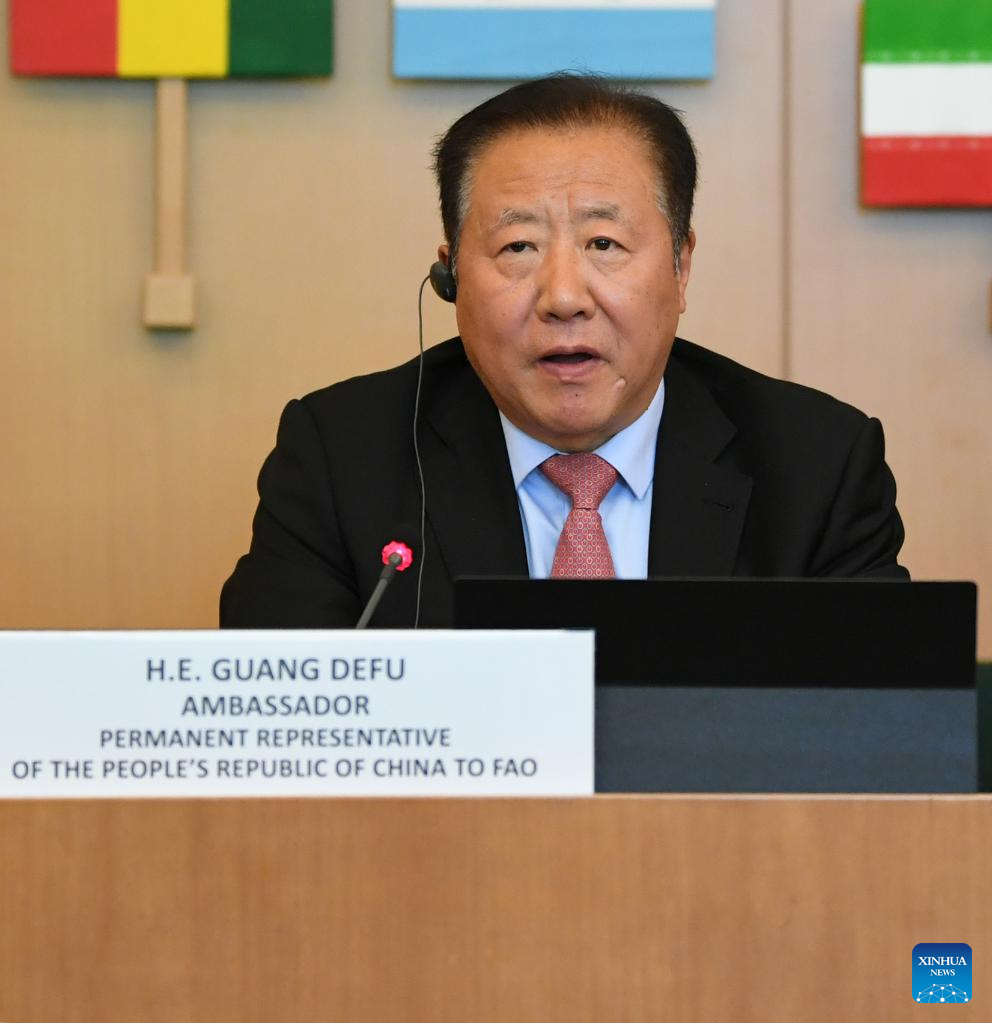
Guang Defu, ambassador and permanent representative of China to United Nations Food and Agriculture Organization (FAO), addresses the certificate award ceremony for 24 new Globally Important Agricultural Heritage Systems (GIAHS) sites at the FAO headquarters in Rome, Italy, May 22, 2023.
The FAO awarded certificates at its headquarters here to 24 new GIAHS sites on Monday.
The 24 sites, which have been designated by FAO since the last ceremony in 2018, are located in 12 countries, including China, Spain, Ecuador, Iran, Italy, Japan, South Korea, and Morocco. (Xinhua/Jin Mamengni)

United Nations Food and Agriculture Organization (FAO) Director-General Qu Dongyu (L, front) and FAO Deputy Director-General Maria Helena Semedo (R, front) taste food products from newly-awarded Globally Important Agricultural Heritage Systems (GIAHS) sites located in China, at the FAO headquarters in Rome, Italy, May 22, 2023.
The FAO awarded certificates at its headquarters here to 24 new GIAHS sites on Monday.
The 24 sites, which have been designated by FAO since the last ceremony in 2018, are located in 12 countries, including China, Spain, Ecuador, Iran, Italy, Japan, South Korea, and Morocco. (Xinhua/Jin Mamengni)
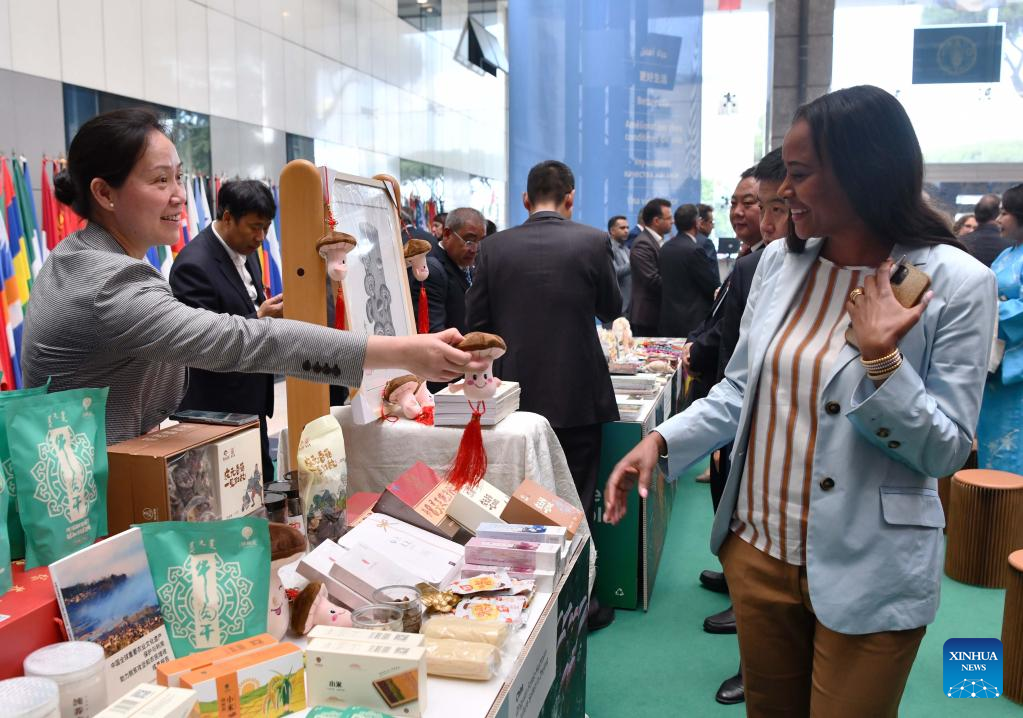
A representative of Qingyuan Forest-Mushroom Co-culture System in China's Zhejiang Province communicates with an attendee at the United Nations Food and Agriculture Organization (FAO) headquarters in Rome, Italy, May 22, 2023.
The FAO awarded certificates at its headquarters here to 24 new Globally Important Agricultural Heritage Systems (GIAHS) sites on Monday.
The 24 sites, which have been designated by FAO since the last ceremony in 2018, are located in 12 countries, including China, Spain, Ecuador, Iran, Italy, Japan, South Korea, and Morocco. (Xinhua/Jin Mamengni)

A representative of Anxi Tieguanyin Tea Culture System in China's Fujian Province performs tea art at the United Nations Food and Agriculture Organization (FAO) headquarters in Rome, Italy, May 22, 2023.
The FAO awarded certificates at its headquarters here to 24 new Globally Important Agricultural Heritage Systems (GIAHS) sites on Monday.
The 24 sites, which have been designated by FAO since the last ceremony in 2018, are located in 12 countries, including China, Spain, Ecuador, Iran, Italy, Japan, South Korea, and Morocco. (Xinhua/Jin Mamengni)
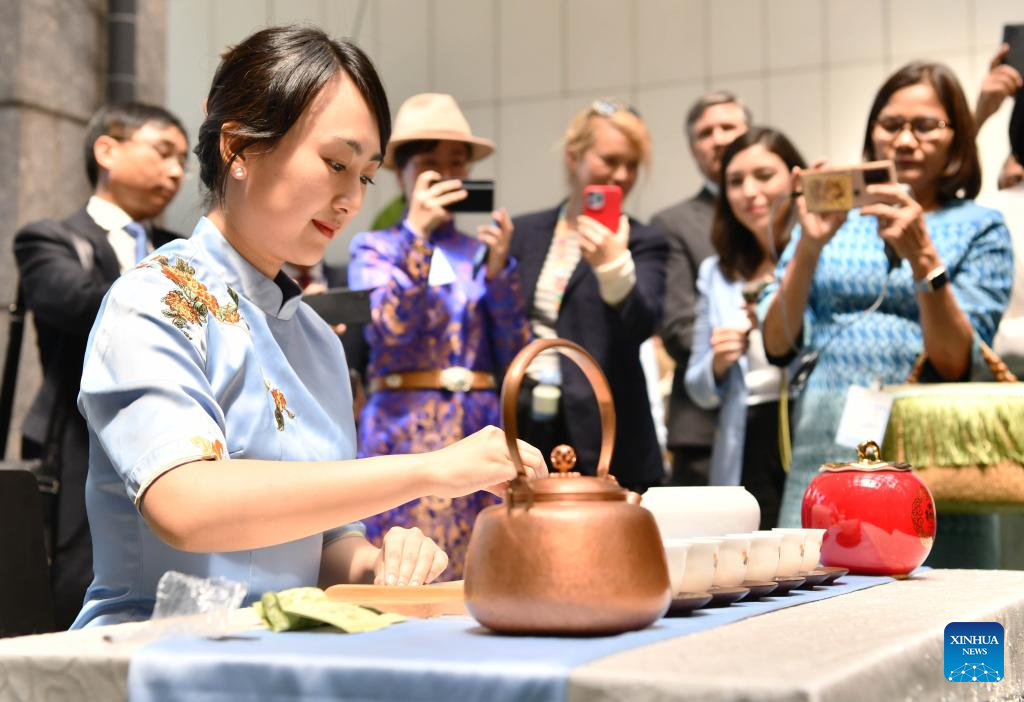
A representative of Anxi Tieguanyin Tea Culture System in China's Fujian Province performs tea art at the United Nations Food and Agriculture Organization (FAO) headquarters in Rome, Italy, May 22, 2023.
The FAO awarded certificates at its headquarters here to 24 new Globally Important Agricultural Heritage Systems (GIAHS) sites on Monday.
The 24 sites, which have been designated by FAO since the last ceremony in 2018, are located in 12 countries, including China, Spain, Ecuador, Iran, Italy, Japan, South Korea, and Morocco. (Xinhua/Jin Mamengni)
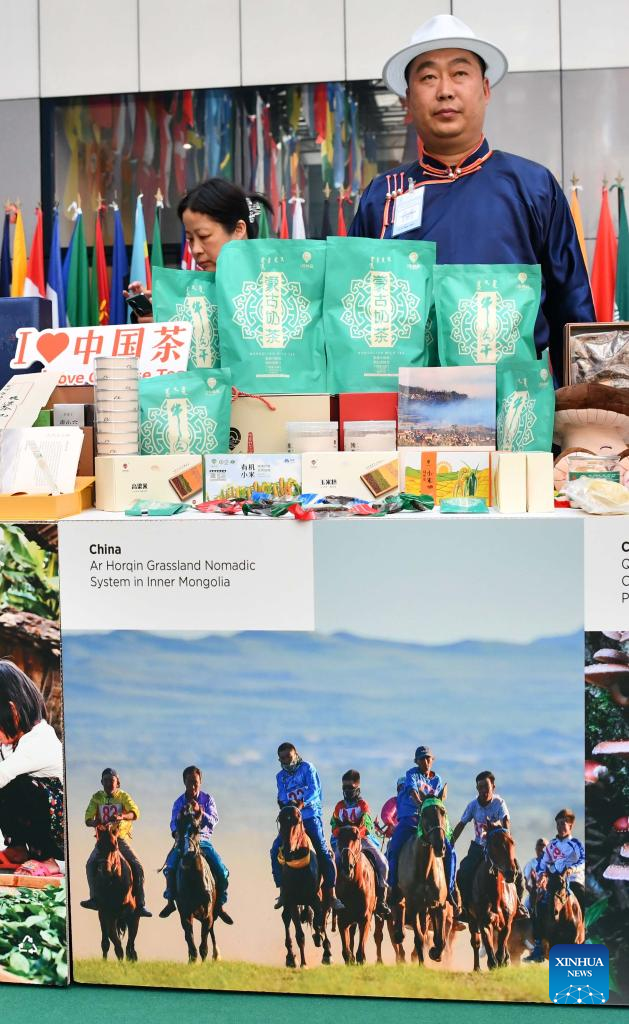
A representative of Ar Horqin Grassland Nomadic System in China's Inner Mongolia Autonomous Region displays local products at the United Nations Food and Agriculture Organization (FAO) headquarters in Rome, Italy, May 22, 2023.
The FAO awarded certificates at its headquarters here to 24 new Globally Important Agricultural Heritage Systems (GIAHS) sites on Monday.
The 24 sites, which have been designated by FAO since the last ceremony in 2018, are located in 12 countries, including China, Spain, Ecuador, Iran, Italy, Japan, South Korea, and Morocco. (Xinhua/Jin Mamengni)
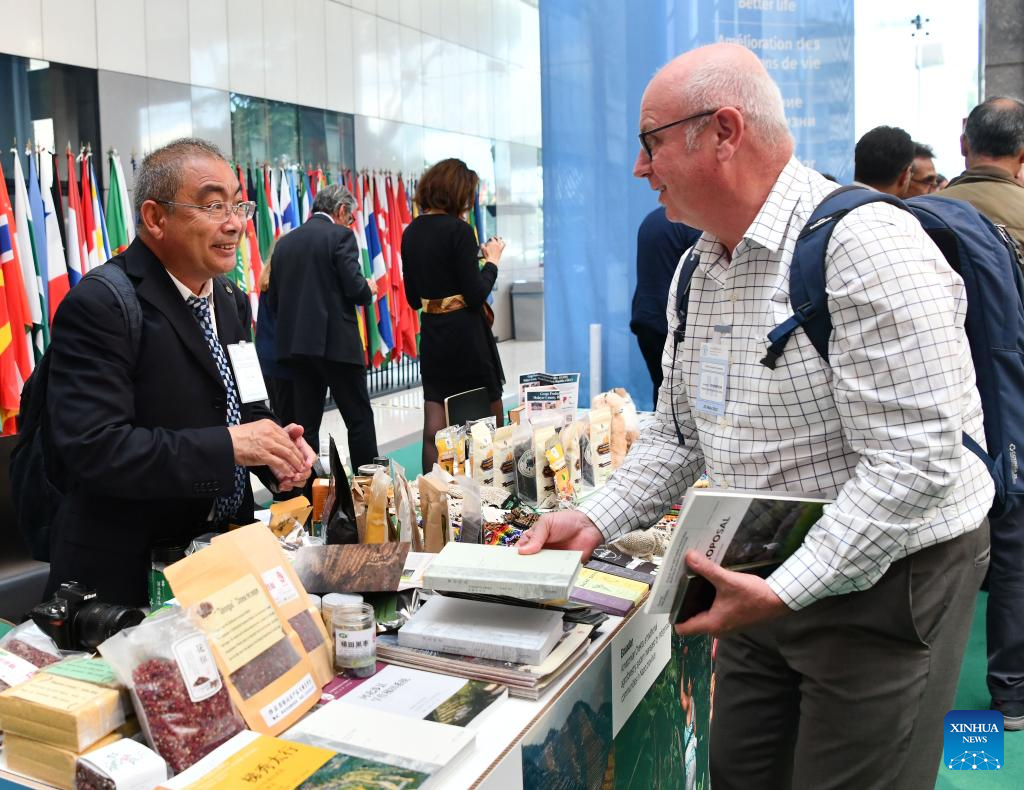
A representative of Shexian Dryland Stone Terraced System in China's Hebei Province communicates with an attendee at the United Nations Food and Agriculture Organization (FAO) headquarters in Rome, Italy, May 22, 2023.
The FAO awarded certificates at its headquarters here to 24 new Globally Important Agricultural Heritage Systems (GIAHS) sites on Monday.
The 24 sites, which have been designated by FAO since the last ceremony in 2018, are located in 12 countries, including China, Spain, Ecuador, Iran, Italy, Japan, South Korea, and Morocco. (Xinhua/Jin Mamengni)



